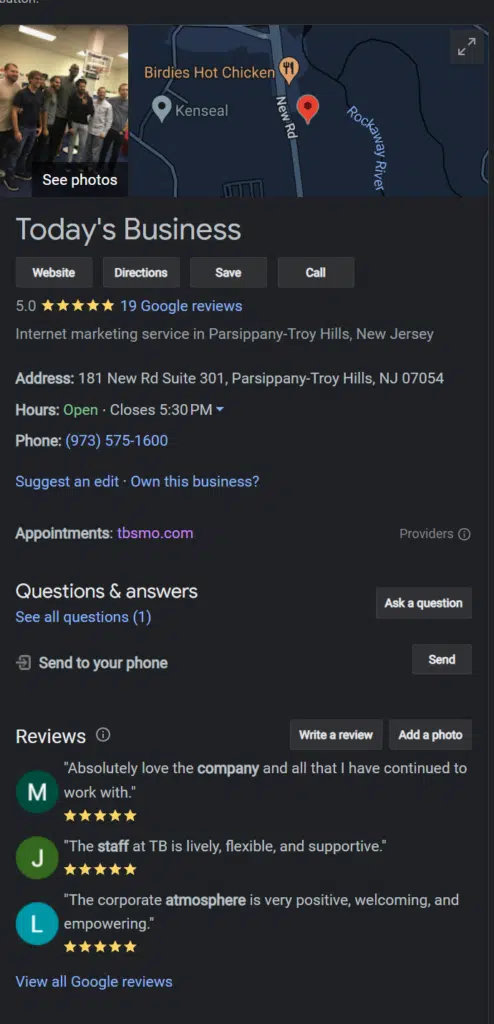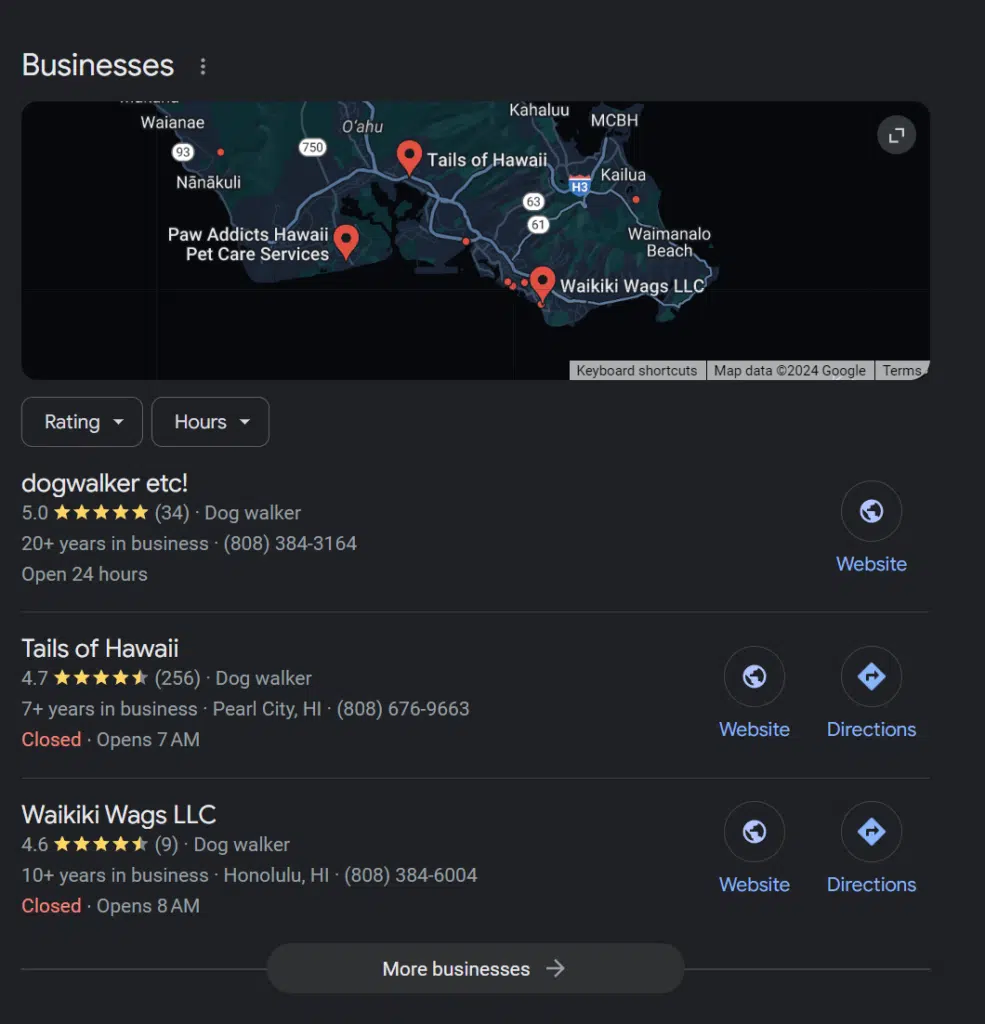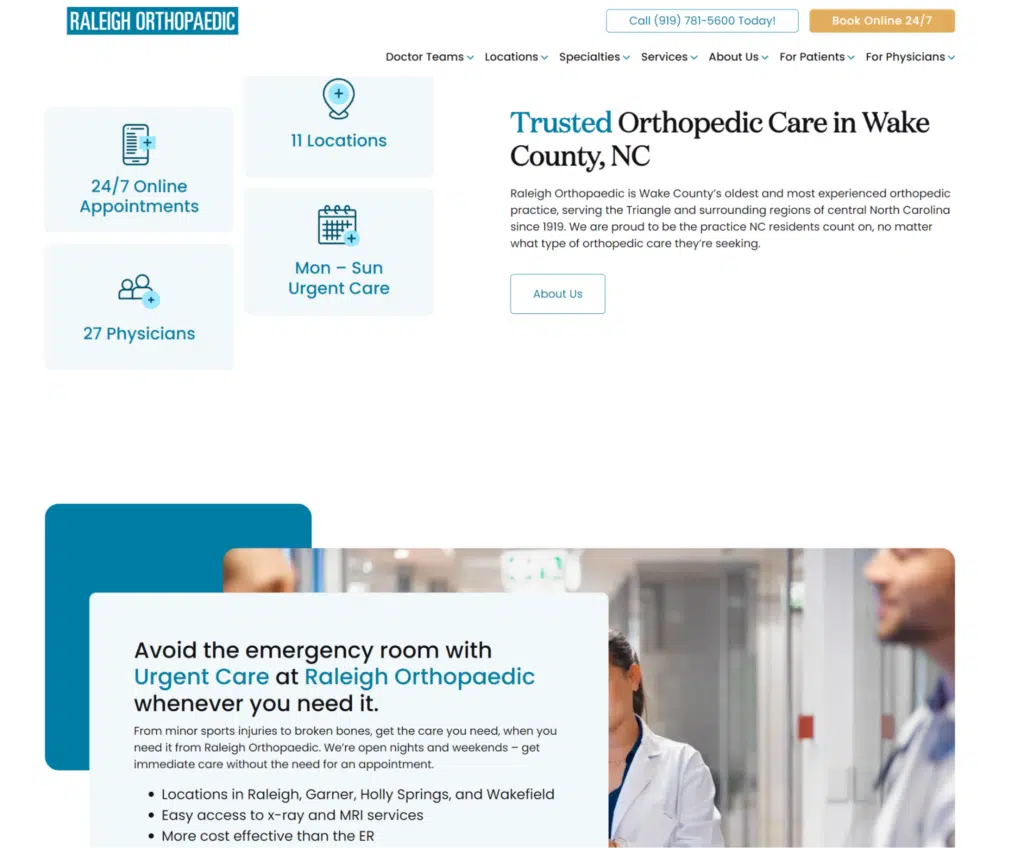
What is Local SEO?
If you’ve ever heard the term ‘SEO’ or ‘search engine optimization’ and thought to yourself, “I know what that is. It’s just organic search,” you’d be on the right track. SEO is the practice of optimizing a website and external listings (more on ‘external listings later) so that they are easier to find by a search engine, such as Google or Bing, and in turn, easier to find for users. Local SEO takes some additional factors into account and focuses more on ‘local’ users instead of people located in other states or countries.
But in order to get to local SEO, let’s think about SEO overall first. What is it, really? How does it work, and how is it different from all of the other marketing acronyms out there, like SEM, PPC, and things like Email Marketing? If you run a medical practice, such as an orthopedic clinic, dentist office, urgent care, or other medical facility that relies on patients from your local community finding your practice online, being able to book appointments with ease, and discover you over competing practices, then look no further. SEO is for you, and dollar for dollar, pound for pound, it’s the most cost-effective way to ensure the longevity and authenticity of your practice. We’ll throw out the mechanics for a minute of what SEO is on the technical side and consider what really matters – how can you flourish through marketing, find the right patients, and grow your practice over time? We say the answer is a combination of good healthcare practices and great SEO! Two things that go hand-in-hand.

If you build it – they will come. We’ve heard that before, but that may not always be true. If you started a new medical clinic in a small town with a severe need for quality healthcare, it’s true, that people will certainly come to your practice without much additional effort on your part. But for many providers, larger and more populated areas are more common sites for establishing a practice. This sometimes means that you may have several other clinics or providers in the same area with existing patients that you naturally want to attract to your practice. This is where SEO can help.
While we do not discourage running ads, especially if you want to aggressively attract walk-ins or new appointments, ads are short-lived; in other words, they only last as long as you run them, and if someone did not click on your ad and then convert on it, i.e. fill out a form or make a phone call, or book an appointment, they might not ever hear about you or remember you exist ever again.
SEO on the other hand is free; besides the opportunity cost, i.e. labor and cost of expertise, you do not have to pay a search engine to recommend your website to potential patients. Once you correctly ‘optimize’ the correct places on your website and set up your business for local search, the build it and they will come starts to happen naturally.
Traditional SEO versus Local SEO
Now that we have discussed SEO as a whole, let’s dive into the local aspect of it. Local SEO is a subset of more traditional SEO. Sometimes called standard SEO, national SEO, or just ‘SEO’, we follow the same overarching practices for search engine optimization, but we make a special effort to go after people in a specific area. This is called ‘geotargeting’, and it is effective for local businesses and healthcare facilities.
For example, if you owned a restaurant in New Jersey, you wouldn’t need to attract hungry people in Ohio. If you offered online consulting services that someone from any state could use, it would then make more sense to go after anyone who lived in the United States or Canada.
Many people do not realize that Google has an additional algorithm just for what it thinks are ‘local searches’. This means that it is smart enough to notice searches such as ‘doctor near me’, ‘best orthopedic surgeon texas’, or ‘pt that takes BCBS’. In the same way that a person might type ‘bars open now’ and get a list of bars in their area, that same logic will be used to serve them the doctors and providers nearest them with a corresponding and relevant search. Google is able to establish the intent of a search as well as the locality, and this is why optimizing for local searches, both on your website and in other appropriate places, will start to drive the type of traffic that would naturally seek out your business.
SEO versus Paid Search (or PPC)
It’s hard to have a conversation about SEO without discussing paid advertising, also lumped together with SEM, or referred to as PPC (pay-per-click). That’s because if you or your practice are newer to digital advertising, or even just starting out, it might seem like there is no difference between paying for an ad and paying Google/search engines to list your website in their search results.
Fortunately, that’s not exactly how the process works. Earlier we mentioned that ads can have a place in your overall marketing strategy, but they often bear not just the cost of labor and monitoring, but an additional fee paid to Google or Facebook, depending on which ad platform(s) you use. This additional cost is ‘per click’, so that for every one person that clicks your ad, you might pay $1 or $2.23 or $5.19 – whatever the cost is for that click. This can add up over time, so you would normally plan to set aside that money, be it $500 or $5,000 for the sole purpose of keeping your ads running.
SEO has no such expense. There is only the cost of labor, paid to an experienced marketing professional who thoroughly understands SEO. Usually, unless you have a very large and extensive health organization, such as a hospital network, it may not be in your best interest to hire an exclusive person dedicated to SEO, as the commitment on time per month may be as low as 10 hours, though it can vary by how many locations and providers you have, and how much initial work might need to be done on your website. Most importantly, the effects of SEO are long-lasting and compounding. Despite what you may hear, ads do not convey permanent and lasting visibility to your business. A successful ad campaign can be great at generating brand awareness for your medical practice, but in the healthcare industry, you wouldn’t usually run ads without SEO. You can, however, dedicate your spending to search engine optimization, with a heavy focus on local SEO all without the need for ads, and in fact, many organizations may choose this latter option for long stretches, only spending on ads during a campaign or certain time of the year.

Importance of Local SEO for Healthcare
Local SEO is more important for healthcare than ever. While there are sometimes minor differences across industries when it comes to local SEO, it is important to understand what impact local SEO can have on your clinic or practice, and why it should be considered one of your most important investments from an operations standpoint.
Google’s Map Pack and Business Profile
If you’ve ever searched for a local business, be it a restaurant, a used book store, or your nearest eye doctor, you might have noticed a card that comes up in your browser.

This is a Google Business Profile, formally called ‘Google My Business or GMB’, and if you have a brick-and-mortar business, or offer local services, having your own profile is crucial. Patients may not even go to your website, or the website of any competitor. They may instead just do a local search and call whatever pops up closest to them in the listings. With this in mind, you no longer have a leg up on the competition by simply filling out a profile to its fullest; you merely will have met basic requirements for staying visible to potential patients and customers.
Additionally, an optimized business profile allows you to be part of Google’s Map pack as well. Just take a look at what happened when I searched for ‘dog walker Hawaii’:

Keep in mind, while there are other search engines besides Google, and especially other ‘directory listings’, like Yelp, filling out your Google Business Profile first and foremost can help other directories and search engines eventually capture the correct information about your business, and Google’s profile is considered the main source of truth when it comes to what we call directory listings. You’ll just want to be sure that your Business Profile information is – above all else – accurate, and that it uses the same exact name as your practice.
For example, if you have an Orthopedic Urgent Care called ‘Anytime OrthoCare’, you would not call it “Anytime Ortho Care’ or “Anytime Ortho’ on your Google Business Profile. Those are technically not the same name! And you’ll want to use the same street information too, so that 123 Main St. should show as exactly that on both your website location page and/or footer, and your GBP.
Finally, let’s go over some of the unique elements of a business profile that pertain to healthcare.
Clinic Profiles
If you have a practice, it would be listed as a medical clinic, walk-in, physical therapy, and so forth. For each location that you have, you would need a profile. This might seem a little tricky, but remember that the point of a business profile relates back to its locality, so it revolves around Google Maps. ‘Anytime OrthoCare’ from the example above could have a location in Playa Vista, but also one in Beverly Hills. That would mean it would need to have a separate profile for both locations, with each location giving its unique address and operating hours.
Your clinic profile should also be sure to include any category that encapsulates its services. A physical therapy office might also offer medical massage, or have acupuncture, so that should be included, with physical therapy clinic being flagged as the primary category. Categories serve as keywords and help determine which results show up for local search, so optimizing your location’s categories is an important step.
Provider Profiles
Unlike a restaurant, which may feature an esteemed chef, the healthcare industry has a unique option in ‘provider profiles’. This means that even a James Beard award-winning chef wouldn’t normally have his own business profile, but your healthcare providers will each have their own, dedicated GBP. This allows even more visibility for your practice, as some patients may only know they ‘see Dr. Smith on Maple Street’, versus the name of the practice itself. This holds especially true if a certain doctor works out of a hospital, which can make it harder for patients to locate their physician.
Appointment Links
Because some patients may be looking for you specifically to either call and make an appointment, or book quickly online, they may type in your exact business clinic or provider name. From there, it can be a hassle for such patients to then have to go to your website and fill out a form for an appointment. In their mind, it’s one extra click!
This is why many healthcare providers allow a patient to click directly on an appointment link that can be generated through a third-party booking platform, such as Zocdoc, or add custom services with an image, description, and easy access booking.
Facility Hours and Information
Google Business Profiles also allow an organization to clearly show hours of operation, special holiday closures, and give quick information at a glance, such as accepted insurance. This is especially helpful for healthcare providers as it can cut down on phone time for the office and make it easier for established or incoming patients to double-check times or insurances before booking that appointment.
Photos and Reviews
While every GBP hosts photos and reviews, this is a unique opportunity for smaller clinics or practices to stand out and showcase, visually, what may be inviting about their clinic over a large hospital chain. Maybe it’s the location, easy parking, or quick walk to the front door that will sell some patients. Your profile gives you a chance to tell that story. Meanwhile, having a handful of positive reviews can sway a person who is looking for a personable doctor, who spends extra time with patients, and makes them feel comfortable. Hearing it from others makes a world of difference.
Why Reviews Matter
Above, we just mentioned that reviews matter. It’s obvious that if enough people say something positive about their experience, it can help you pull in potential patients. But reviews are important for a different reason too. They are a weighted factor in Google’s local algorithm, which means the more positive reviews you have, the more Google wants to show people your profile.
Additionally, if reviewers mention some of your services more specifically, this can really show people that you really are who you say you are. For example, someone might be a little anxious about getting lip fillers for the first time, even if you go into detail on your website about the safety of the product or the expertise of the provider. But when you have several reviews combined with such service pages, it helps establish your credibility in the eyes of search engines and patients.
Other Citations
Even though we just talked about Google Business Profiles as the ultimate listing directory, it doesn’t mean other listings won’t be important. Medical directory listings are important for healthcare providers and are just another piece of the puzzle. It is cost-effective and in your best interest to monitor all of your main directory listings, manage a list of local keywords, and watch out for changes or needed actions.

Your Website and On-Page SEO
What should be on a healthcare website for optimal SEO? Along with the technical and on-page factors that affect your website, you’re going to need core staples. These include:
Location Pages
If you have one location, then your website can reflect that by showcasing your address and most likely including additional service areas, and making generous mention about the locality of where you practice. This is not just for readers, but to help search engines out too.
For each location you have, you will want a unique location page. That means that if you have five different offices, you would want at least one location page for each. In some cases, if one of your locations has something like a separate urgent care, you may even need an extra page dedicated to that, too!
And of course, every location page that you will have will need schema markup. A skilled SEO will be able to not just create a well-organized, keyword-rich location page, but include the correct healthcare schema as well. This is a type of ‘code’ that search engines can ‘crawl’ (or read, in an an organized and structured language), so that there is no ambiguity about your location.
Condition Pages
Condition pages are important to include on your website for several reasons, namely, you want to provide an opportunity to explain a medical condition that you treat from an ethical perspective. Reading a condition page on a site helps establish trust between you and your patient, which also happens to be one of the factors that contribute to how well a website ranks according to Google.
There are a number of SEO factors that come into play regarding condition pages on healthcare sites. Your goal will never be to compete against a medical compendium such as WebMD or the AAOS site. Instead, you can site those resources, and make patients aware of what the most modern research has to say on the matter, and link your services and conditions pages back to each other for an even greater optimization boost!
NAP Information
As covered in the Google My Business section, your name, address, and phone number are important to include on your site. This information should match listing directories, making it easier for patients to fin you and avoid any confusion with a different business.
Local Backlinks
Links are one of the most important factors for ranking. What are links? Essentially, they are nods back to your website. Also known as hyperlinks, it’s when another website mentions a page of your website and makes a clickable hyperlink leading back to any page on your website. While ‘links’ are important traditionally for SEO, local links are judged a little differently than the more traditional, standard version of SEO. Because of this, getting local businesses to mention your practice, linking back to your website, becomes extremely valuable.
For example, if you are a doctor who also coaches a little league baseball team, or donates money to a local animal shelter, then you can get a little help back! Have their website link back to your main location page or even your biography, and it can help boost your local SEO. And while traditional ‘backlinking’ that you may hear about in standard SEO is still valuable, getting local links is often easier and remains important to search engines like Google.
Which Healthcare Industries Should Focus On Local SEO
There are very few websites that should not incorporate SEO. A brochure site for architects, for example, might be more of a portfolio than anything. And if you are a company that sells online dog treats to anywhere in the US, it wouldn’t make sense to optimize locally. However, the healthcare is local, and there aren’t any kinds of practices that wouldn’t benefit from it. This includes:
Should You Work with an SEO Agency?
SEO, including local search engine optimization, can be time-consuming and complicated. Not only is there abundant misinformation out there, but a number of marketing companies claim to do SEO without being highly specialized or experienced in the industry. Not only that but optimizing a medical practice has a unique set of challenges that come with trial and error.
It is recommended to work with an agency only after they have been vetted and can produce results to back up their claims.
Local SEO for your Healthcare System with Today’s Business
At Today’s Business, we grow medical practices. We are highly specialized in marketing for the medical industry both in local SEO, advertising, and data analytics. We provide regular reporting, both executive summaries and deep, monthly analysis, goal-setting, and education so that our clients can learn and understand the process as they grow their practice. If you’re ready to learn more about how you can grow your surgery center or other similar medical practice, feel free to reach out via our contact form and help us get to know you today.